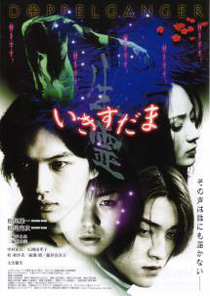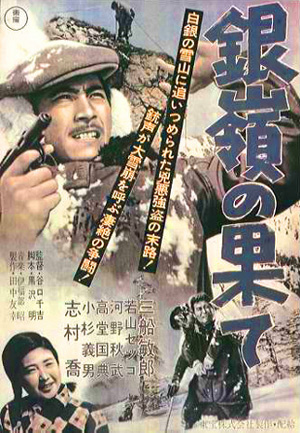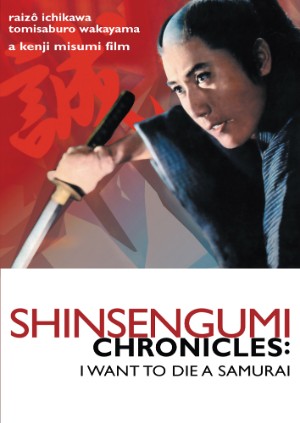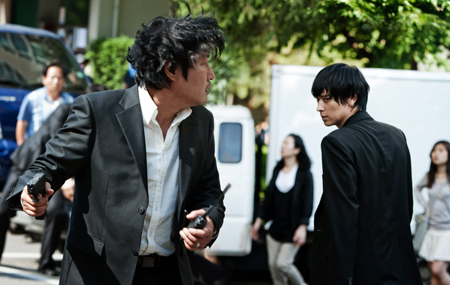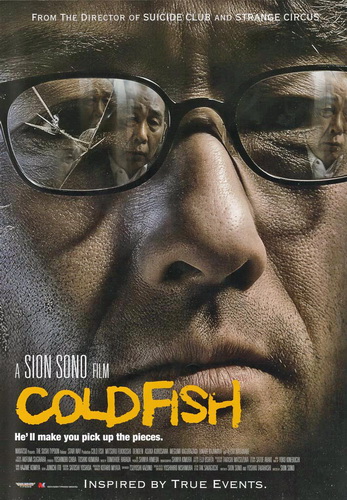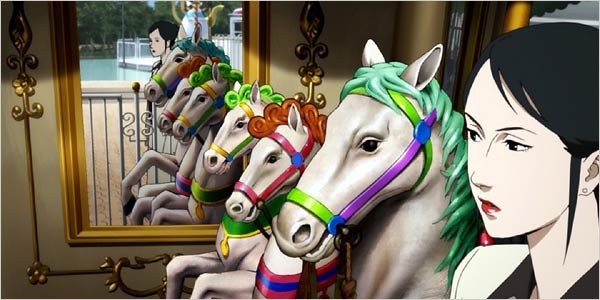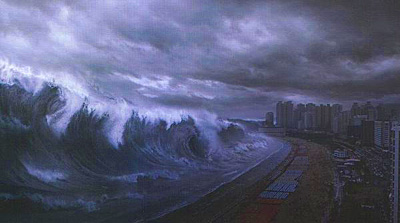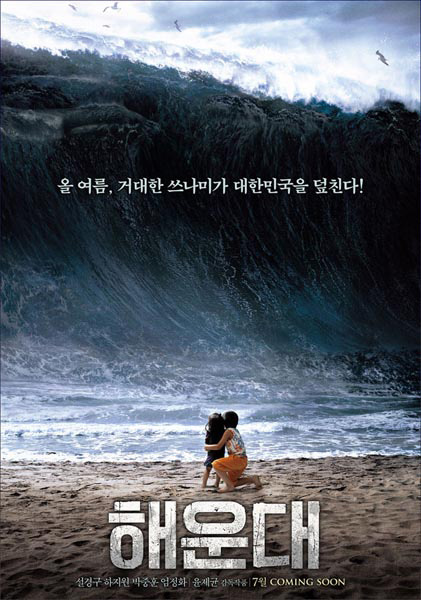Inugami (2001)
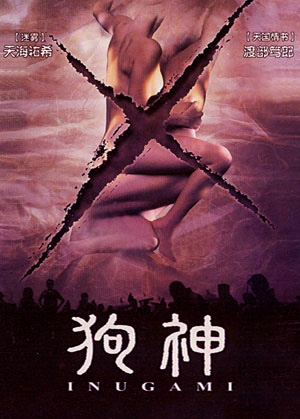 Inugami is a beautifully rendered film based on what I would guess is an unfilmable novel by Masako Bando. Therefore, there's something of the WTF to the proceedings, requiring an open mind and a willingness to just let things happen. The film was shot in lush locations of dazzling natural beauty in the mountainous regions of Shikoku, the smallest of the four major islands of Japan. Shikoku is commonly known as a rural backwater with towns full of superstitious, xenophobic hicks (a pivotal factor in the film). But that's always the way, isn't it? You get to some beautiful, remote corner of the world only to be repulsed by the locals. In this case they're the Shinto version of Puritan witch-burners and they've got their sites set on Miki (lovely Yuki Amami), a member of the mysterious and wealthy Bonomiya family who, for generations, have been associated with deadly supernatural dog spirits known as inugami (inu = dog, gami = gods). Curses, ghosts, incest, suicide, lovely scenery, there's something for everyone (even if you're not quite sure what's going on). Castwise, it's great to see Shiho Fujimura and Keiko Awaji, two veteran actresses of classic samurai cinema, appearing here in their twilight years; time hasn't done a thing but wrinkle them. Then there's Atsuro Watabe who more recently appeared as the priest dad in Love Exposure. The Verdict: Not a horror film, but not a bad escape either.
Inugami is a beautifully rendered film based on what I would guess is an unfilmable novel by Masako Bando. Therefore, there's something of the WTF to the proceedings, requiring an open mind and a willingness to just let things happen. The film was shot in lush locations of dazzling natural beauty in the mountainous regions of Shikoku, the smallest of the four major islands of Japan. Shikoku is commonly known as a rural backwater with towns full of superstitious, xenophobic hicks (a pivotal factor in the film). But that's always the way, isn't it? You get to some beautiful, remote corner of the world only to be repulsed by the locals. In this case they're the Shinto version of Puritan witch-burners and they've got their sites set on Miki (lovely Yuki Amami), a member of the mysterious and wealthy Bonomiya family who, for generations, have been associated with deadly supernatural dog spirits known as inugami (inu = dog, gami = gods). Curses, ghosts, incest, suicide, lovely scenery, there's something for everyone (even if you're not quite sure what's going on). Castwise, it's great to see Shiho Fujimura and Keiko Awaji, two veteran actresses of classic samurai cinema, appearing here in their twilight years; time hasn't done a thing but wrinkle them. Then there's Atsuro Watabe who more recently appeared as the priest dad in Love Exposure. The Verdict: Not a horror film, but not a bad escape either.Shikoku (1999)
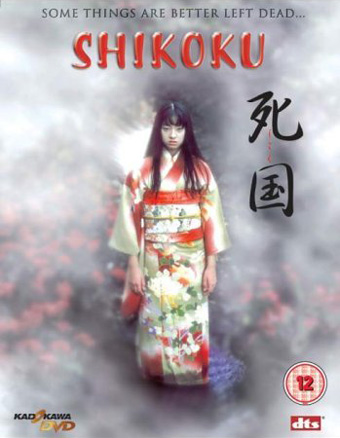 Guess where this film is set? Yep, we're back on the island, but this time out the villagers aren't quite so hostile, the tone is more low-key, the focus softer (literally -- either they blew it up from 16 mm or they smeared vaseline on the lens). That said, it's far more creepy and, in my opinion, the most J-horror of the four films on offer. Three childhood friends are separated (one moves to Tokyo, one dies), only to be reunited as adults (well, the boy and girl who lived are adults -- the dead girl never made it past 16). So it's a supernatural love triangle with, once again, a Shinto-inflected back story. This is the one film of the four that I'd seen previously; I was drawn not only by the J-horror but the presence of Chiaki Kuriyama (here playing the ghost girl Sayori). There's something captivating about Kuriyama; she's not the greatest beauty -- got something of a honker to be frank. But she conveys an intriguing, cat-like essence I found striking upon first encountering her as the knife-wielding Chigusa in Battle Royale: "Come at me. Every inch of me will resist you!" Her unique blend of schoolgirl prim and feline menace work perfectly in Shikoku. Elsewhere there's the great Makoto Sato in a small role as Sendo the yamabushi (mountain priest) who's determined to close the portal through which Sayori has returned. If you don't know who Makoto Sato is, look him up in the index of Warring Clans, Flashing Blades. You've got some great performances to look forward to!
Guess where this film is set? Yep, we're back on the island, but this time out the villagers aren't quite so hostile, the tone is more low-key, the focus softer (literally -- either they blew it up from 16 mm or they smeared vaseline on the lens). That said, it's far more creepy and, in my opinion, the most J-horror of the four films on offer. Three childhood friends are separated (one moves to Tokyo, one dies), only to be reunited as adults (well, the boy and girl who lived are adults -- the dead girl never made it past 16). So it's a supernatural love triangle with, once again, a Shinto-inflected back story. This is the one film of the four that I'd seen previously; I was drawn not only by the J-horror but the presence of Chiaki Kuriyama (here playing the ghost girl Sayori). There's something captivating about Kuriyama; she's not the greatest beauty -- got something of a honker to be frank. But she conveys an intriguing, cat-like essence I found striking upon first encountering her as the knife-wielding Chigusa in Battle Royale: "Come at me. Every inch of me will resist you!" Her unique blend of schoolgirl prim and feline menace work perfectly in Shikoku. Elsewhere there's the great Makoto Sato in a small role as Sendo the yamabushi (mountain priest) who's determined to close the portal through which Sayori has returned. If you don't know who Makoto Sato is, look him up in the index of Warring Clans, Flashing Blades. You've got some great performances to look forward to!So that's it. Not much of a Halloween offering, I'm afraid. But no worries, there's always Kwaidan (1964), Jigoku (1960), Organ (1996), Pulse (2001), Illusion of Blood (1965), Ringu (1998), Ju-on: The Grudge (2002), Kuroneko (1968), Matango (1963) and, of course, Evil Dead Trap (1998).

